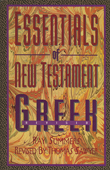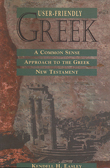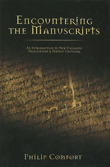Essentials for New Testament Greek Studies (3 vols.)
Digital Logos Edition
This collection offers three important resources for studying the Greek New Testament and its early manuscripts. For many years Ray Summers' Essentials of New Testament Greek has been a classic standard in the classroom and its revised edition, offered here, is even more helpful to students and ministers alike. Kendell Easley demonstrates the necessity of not only learning New Testament Greek but how to apply that knowledge as students and ministers study, preach, and teach from the New Testament. Philip Comfort brings paleography and textual criticism together as a means to proficiently encounter the early manuscripts of the New Testament.

- Three resources for studying the Greek New Testament
- Discusses topics like how to apply New Testament Greek knowledge and early manuscripts of the New Testament
- Ideal for students and pastors
This title is included in the following collections
You can save when you purchase this product as part of a collection.
Essentials for New Testament G...
$76.96$60.99Logos 7 Baptist Gold Legacy Li...
$849.99$849.99Logos 6 Baptist Gold Legacy Li...
$849.99$849.99Logos 5 Baptist Gold Legacy Li...
$849.99$849.99
- $1,499.99
- $1,499.99
- $1,499.99
- $2,999.99
- $2,999.99
- $2,999.99
- $4,749.99
- $23,999.99$17,999.99

Essentials of New Testament Greek, Revised
- Authors: Ray Summers, revised by Thomas Sawyer
- Publisher: Broadman and Holman
- Publication Date: 1995
- Pages: 199
For more than fifty years Summers’ book has been a classic textbook and essential tool for students of New Testament Greek. Thomas Sawyer has updated this time-honored classic to make it even more effective for today’s students. The book’s major features are: a step-by-step approach to guide students through the learning process; clear explanations of the Greek language and how it works; extensive appendices with paradigms, indexes, and verb list; high-frequency Greek vocabulary, presenting every word used 50 times or more in the New Testament; numerous examples from the Greek New Testament to illustrate grammatical points; translation exercises which use nearly 300 New Testament verses; and an expanded, easy-to-read verb chart. Essentials of New Testament Greek, Revised is an exceptional textbook for college and seminary students, an effective resource for ministers, and an efficient guide for self-study.
Ray Summers served as a professor of New Testament and Greek at Southwestern Baptist Theological Seminary, The Southern Baptist Theological Seminary, and Baylor University, where he was Chairman of the Religion Department. He is the author of Worthy is the Lamb
Thomas Sawyer is Professor of Religion and Coordinator of the Religion and Philosophy Department at Mars Hill College. He received his B.A. from Furman University, a B.D. and Th.M. from Southeastern Baptist Theological Seminary, and a Ph.D. from The Southern Baptist Theological Seminary.

User-Friendly Greek: A Common Sense Approach to the Greek New Testament
- Author: Kendell H. Easley
- Publisher: Broadman and Holman
- Publication Date: 1994
- Pages: 175
Easley’s inspiration for this book comes in a recommendation written several centuries ago from Martin Luther who said, “Languages are the sheath which hides the Sword of the Spirit…so although the faith of the gospel may be proclaimed by a preacher without the knowledge of the languages, the preaching will be feeble and ineffective. But where the languages are studied, the proclamation will be fresh and powerful, the Scriptures will be searched, and a faith will be constantly rediscovered through ever new words and deeds.” User-Friendly Greek is designed to help students and ministers bridge the gap between learning New Testament Greek and applying that knowledge as they study, preach, and teach from the New Testament. It is a practical resource, filled with useful summary tables and charts, and a great complement to the Greek Testament.
Kendell Easley was an associate professor of New Testament and Greek at Mid-America Baptist Theological Seminary in Tennessee. He is now director of the Master of Christian Education program at Union University in Germantown, TN, and serves as professor of Christian Studies. He received a B.A. from John Brown University, an M.Div from Trinity Evangelical Divinity School, and a Ph.D. from Southwestern Baptist Theological Seminary. He is the author of Revelation in the Holman New Testament Commentary and the Holman Quick Source Guide to Understanding the Bible in the Holman Reference Collection (11 volumes).

Encountering the Manuscripts: An Introduction to New Testament Paleography and Textual Criticism
- Author: Philip Comfort
- Publisher: Broadman and Holman
- Publication Date: 2005
- Pages: 415
Paleography is the dating and study of ancient writings and inscription. Textual criticism is the study of manuscripts to determine the trustworthiness of the text with respect to establishing authenticity. Philip Comfort combines these two fields in an excellent introduction, giving readers a window into the transmission of the Bible in the earliest centuries of the church. In Encountering the Manuscripts Comfort explores scribal participation in the production of the earliest New Testament writings, gives an annotated list of all significant Greek manuscripts and early versions, assigns dates for the earliest manuscripts, presents the history of textual variation in the early centuries of the church, details various methods of recovering the original wording of the Greek New Testament, and provides concrete examples for the practice of textual criticism.
Philip Comfort (Ph.D.) is acclaimed as one of the foremost scholars who has examined every single word of every early New Testament manuscript. He has studied English Literature, Greek, and New Testament at Ohio State University and the University of South Africa. He has taught these classes at a number of colleges, including Wheaton College, Trinity Episcopal Seminary, Columbia International University, and Coastal Carolina University. He is the author of The Text of the Earliest New Testament Manuscripts as well as coeditor of The Life Application Bible Commentary New Testament. Comfort coauthored the Holman Treasury of Key Bible Words found in the Holman Reference Collection (11 volumes.)
- Title: Essentials for New Testament Greek Studies (3 vols.)
- Publisher: Broadman and Holman
- Volumes: 3
- Pages: 789
Reviews
2 ratings
Fredd Adams
11/13/2017
Gary Pajkos
7/18/2013